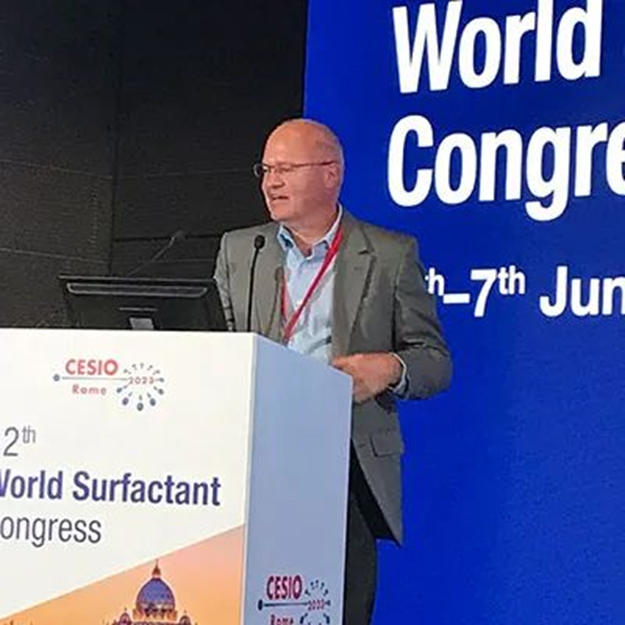The home and personal products industry addresses a range of issues impacting personal care and household cleaning formulations.

The 2023 World Surfactant Conference organized by CESIO, the European Committee for Organic Surfactants and Intermediates, attracted 350 executives from formulation companies such as Procter & Gamble, Unilever and Henkel. Also present were representative companies from all aspects of the supply chain.
CESIO 2023 takes place in Rome from June 5th to 7th.
Conference chair Tony Gough of Innospec welcomed attendees; but at the same time, he set out a series of issues that are sure to weigh on the surfactants industry in the coming weeks, months and years. He pointed out that the new crown epidemic has exposed the limitations of the global health care system; the growth of the global population will make the UN's -1.5°C global climate commitment more difficult; Russia's war in Ukraine is affecting prices; in 2022, EU chemicals Imports began to exceed exports.
"Europe has a difficult time competing with the United States and China," Gough admitted.
At the same time, regulators are placing increasing demands on the cleaning industry and its suppliers, which have been moving away from fossil feedstocks.
"How do we move to green ingredients?" he asked the audience.

More questions and answers were raised during the three-day event, with welcoming remarks from Raffael Tardi of the Italian Association for Fine and Specialty Chemicals AISPEC-Federchimica. "The chemical industry is at the heart of the European Green Deal. Our industry is affected the most by legislative initiatives," he told attendees. “Collaboration is the only way to achieve success without sacrificing quality of life.”
He called Rome the capital of culture and the capital of surfactants; noting that chemistry was the backbone of Italy's industry. Therefore, AISPEC-Federchimica works to improve students' knowledge of chemistry while explaining why cleaning is the best solution to improve consumer health.
Onerous regulations were a topic of discussion in meetings and boardrooms throughout the three-day event. It was unclear whether the comments reached the ears of EU REACH representatives. But the fact is that Giuseppe Casella, head of the European Commission's REACH department, chose to speak via video. Casella's discussion focused on the REACH revision, which he explained has three goals:
Enhance the protection of human health and the environment through adequate chemical information and appropriate risk management measures;
Improve the functioning and competition of the internal market by streamlining existing rules and procedures to increase efficiency; and Improve compliance with REACH requirements.
Registration amendments include new hazard information required in the registration dossier, including information needed to identify endocrine disruptors. More detailed and/or additional information on chemical use and exposure. Polymer Notifications and Registrations. Finally, new mixture partitioning factors have emerged in chemical safety assessments that take into account the combined effects of chemicals.
Other measures include simplifying the authorization system, extending the general risk management approach to other hazard categories and some specialized uses, and introducing the basic use concept aimed at speeding up decision-making in clear cases.
The revisions will also introduce European audit capabilities to support law enforcement authorities and combat illegal online sales. The revisions will improve cooperation with customs authorities to ensure imports comply with REACH. Finally, those whose registration files are not in compliance will have their registration numbers revoked.
When will these measures take effect? Casella said the committee's proposal would be adopted by the fourth quarter of 2023 at the latest. Ordinary legislative procedures and committees will take place in 2024 and 2025.
“REACH was a challenge in 2001 and 2003, but these revisions are even more challenging!” observed Alex Föller, conference moderator from Tegewa.
Many may think EU lawmakers are guilty of overreaching with REACH, but the three largest players in the global cleaning industry have their own sustainability agendas, which were discussed in depth at the opening session of Congress. Procter & Gamble's Phil Vinson began his presentation by praising the world of surfactants.
"Surfactants are thought to have played a key role in the development of life from the formation of RNA," he said. "That may not be true, but it's something worth considering."
The fact is that a one-liter bottle of detergent contains 250 grams of surfactant. If all the micelles were placed on a chain, it would be long enough to travel back and forth under sunlight.
"I've been studying surfactants for 38 years. Think about how they store energy during shear," he enthuses. "Vesoles, compressed vesicles, discoidal twins, bicontinuous microemulsions. That's the core of what we make. It's amazing!"

While the chemistry is complex, so are the issues surrounding raw materials and formulations. Vinson said P&G is committed to sustainable development, but not at the expense of performance. Sustainability needs to be rooted in the best science and responsible sourcing, he said. Turning to end consumers, he pointed out that in a Procter & Gamble survey, three of the top five issues consumers were concerned about were related to environmental issues.
Post time: Jun-03-2019

